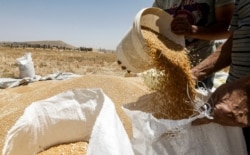Syria could face the worst bread shortages since the outbreak of its decadelong civil war, a U.N. official said.
“There is already some evidence of people cutting out meals,” said Mike Robson, U.N. Food and Agriculture Organization representative for Syria.
“If the currency continues under pressure, imports will be difficult to obtain, and the months leading up to the 2021 wheat harvest may see real shortages,” Robson said.
The prospect of a severe shortage comes as Syria’s wheat harvesting began in late May, and the wheat production last year amounted to less than half of prewar figures.
The possible shortages will harm Syria’s already beleaguered population, where nearly 8 million people — out of a population of 19 million — are without reliable access to food, and 500,000 children are chronically malnourished, the U.N. Office for the Coordination of Humanitarian Affairs reported in March.
President Bashar al-Assad’s government attempted to ration bread in April through its smart card system, which allows people to purchase government-rationed, subsidized goods at authorized retailers every month. However, the distribution of bread through the system is available only in the capital, Damascus, and Rif-Dimashq, a governorate in southwestern Syria.
The bread shortages add to the mounting problems Assad faces, topping the civil war, coronavirus pandemic and most wide-ranging sanctions the U.S. recently implemented.
The Caesar Syria Civilian Protection Act, which went into effect on June 17, is aimed at companies working with the Assad government, particularly those in the construction, energy and engineering sectors. The Caesar Act also targets the Assad regime’s authoritarian allies in Russia and Iran.
Despite its objectives, the sanctions are hurting U.S. Kurdish allies in Syria, who also control the country’s main wheat regions.
“We had always been self-sufficient,” Abdullah, a confectionary trader from Damascus, said in a text to Reuters. “Why we have reached this point where even a loaf will soon become a dream, I really don’t know.”







